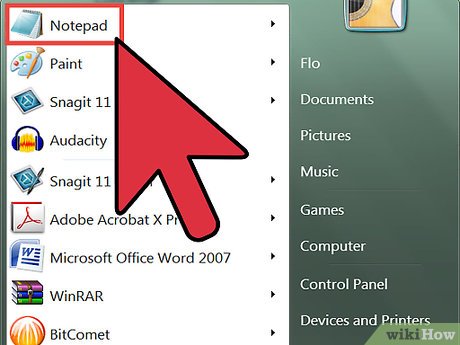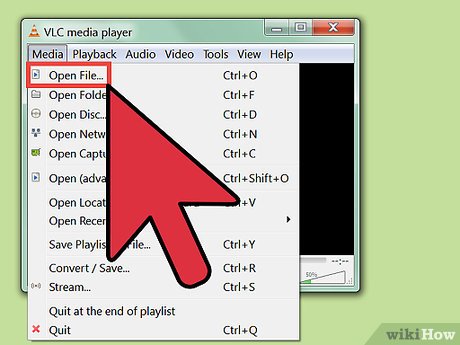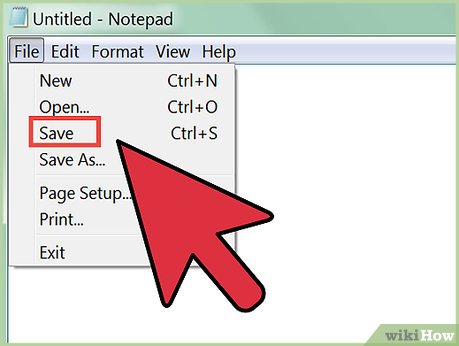How to Edit a Dat File
Method 1 of 5:
Opening and Editing a DAT File
-
 Open the DAT file using a text editor. You can use the text editor that comes with your computer, such as Microsoft's Notepad or OS X's TextEdit.
Open the DAT file using a text editor. You can use the text editor that comes with your computer, such as Microsoft's Notepad or OS X's TextEdit. -
 Look for clues about the file's origin. Sometimes, even if it's filled with unreadable characters, a DAT file will include some text that provides clues as to what type of file it is.[4]
Look for clues about the file's origin. Sometimes, even if it's filled with unreadable characters, a DAT file will include some text that provides clues as to what type of file it is.[4]- For example, if you suspect a DAT file is actually a video file, you can try to open it in a video player.
- If you edit a DAT file with unreadable characters and then save it, it will break the DAT file, making it unusable even if you opened it in the correct program.
-
 Edit the DAT file. Make changes to the DAT file like you would any other text file, and then save the file.
Edit the DAT file. Make changes to the DAT file like you would any other text file, and then save the file.
Method 2 of 5:
Changing the DAT File Extension in Windows
-
 Make sure file extensions are visible. Before you can edit a file extension in Windows, you'll need to make sure file extensions visible. Open Windows Explorer. Go to a folder with files. If the file names are followed by a period (.) and three or more characters, then file extensions are visible. If not, then click here for instructions on making file extensions visible.
Make sure file extensions are visible. Before you can edit a file extension in Windows, you'll need to make sure file extensions visible. Open Windows Explorer. Go to a folder with files. If the file names are followed by a period (.) and three or more characters, then file extensions are visible. If not, then click here for instructions on making file extensions visible. -
 Rename a file extension. Find the file with the extension you want to change. Right-click the file you want to change, and then click Rename. Edit the file extension, and then press Enter. In the dialog box, click Yes to complete the edit.[5]
Rename a file extension. Find the file with the extension you want to change. Right-click the file you want to change, and then click Rename. Edit the file extension, and then press Enter. In the dialog box, click Yes to complete the edit.[5]- If you're not sure what file extension to use, click here for some common file extensions.
Method 3 of 5:
Changing the DAT File Extension in Mac OS X
-
 Make sure file extensions are visible. Before you can edit a file extension in Windows, you'll need to make sure file extensions visible. Open Windows Explorer. Go to a folder with files. If the file names are followed by a period (.) and three or more characters, then file extensions are visible. If not, then click here for instructions on making file extensions visible.
Make sure file extensions are visible. Before you can edit a file extension in Windows, you'll need to make sure file extensions visible. Open Windows Explorer. Go to a folder with files. If the file names are followed by a period (.) and three or more characters, then file extensions are visible. If not, then click here for instructions on making file extensions visible. -
 Rename a file extension. Find the file with the extension you want to change. Right-click the file, and then click Get Info. In the File Info window, in the Name & Extension field, edit the file's extension. When you're done, close the window. In the dialog box, click Keep for the file extension you'd like to use.
Rename a file extension. Find the file with the extension you want to change. Right-click the file, and then click Get Info. In the File Info window, in the Name & Extension field, edit the file's extension. When you're done, close the window. In the dialog box, click Keep for the file extension you'd like to use.
Method 4 of 5:
Making File Extensions Visible in Windows
-
 Open the Control Panel. Click Start, and then click Control Panel. In the Control Panel, click Appearance and Personality.
Open the Control Panel. Click Start, and then click Control Panel. In the Control Panel, click Appearance and Personality. -
 Make file extensions visible. Click Folder Options. Click the View tab, and then, under Advanced settings, uncheck Hide extensions for known file types.[6]
Make file extensions visible. Click Folder Options. Click the View tab, and then, under Advanced settings, uncheck Hide extensions for known file types.[6] -
 Make extensions visible on Windows 8. Open Windows Explorer, and then click the View tab. Click Options, and then click Change folder and search options. Under Advanced settings, scroll down and uncheck Hide extensions for known file types. Click Apply.
Make extensions visible on Windows 8. Open Windows Explorer, and then click the View tab. Click Options, and then click Change folder and search options. Under Advanced settings, scroll down and uncheck Hide extensions for known file types. Click Apply.
Method 5 of 5:
Making File Extensions Visible in Mac OS X
-
 Open the Finder preferences. Open the Finder. Click the Finder menu, and then click Preferences.
Open the Finder preferences. Open the Finder. Click the Finder menu, and then click Preferences. -
 Make extensions visible. Click the Advanced tab. Check Show all filename extensions. Close Finder Preferences.
Make extensions visible. Click the Advanced tab. Check Show all filename extensions. Close Finder Preferences.
Share by
Isabella Humphrey
Update 05 March 2020











